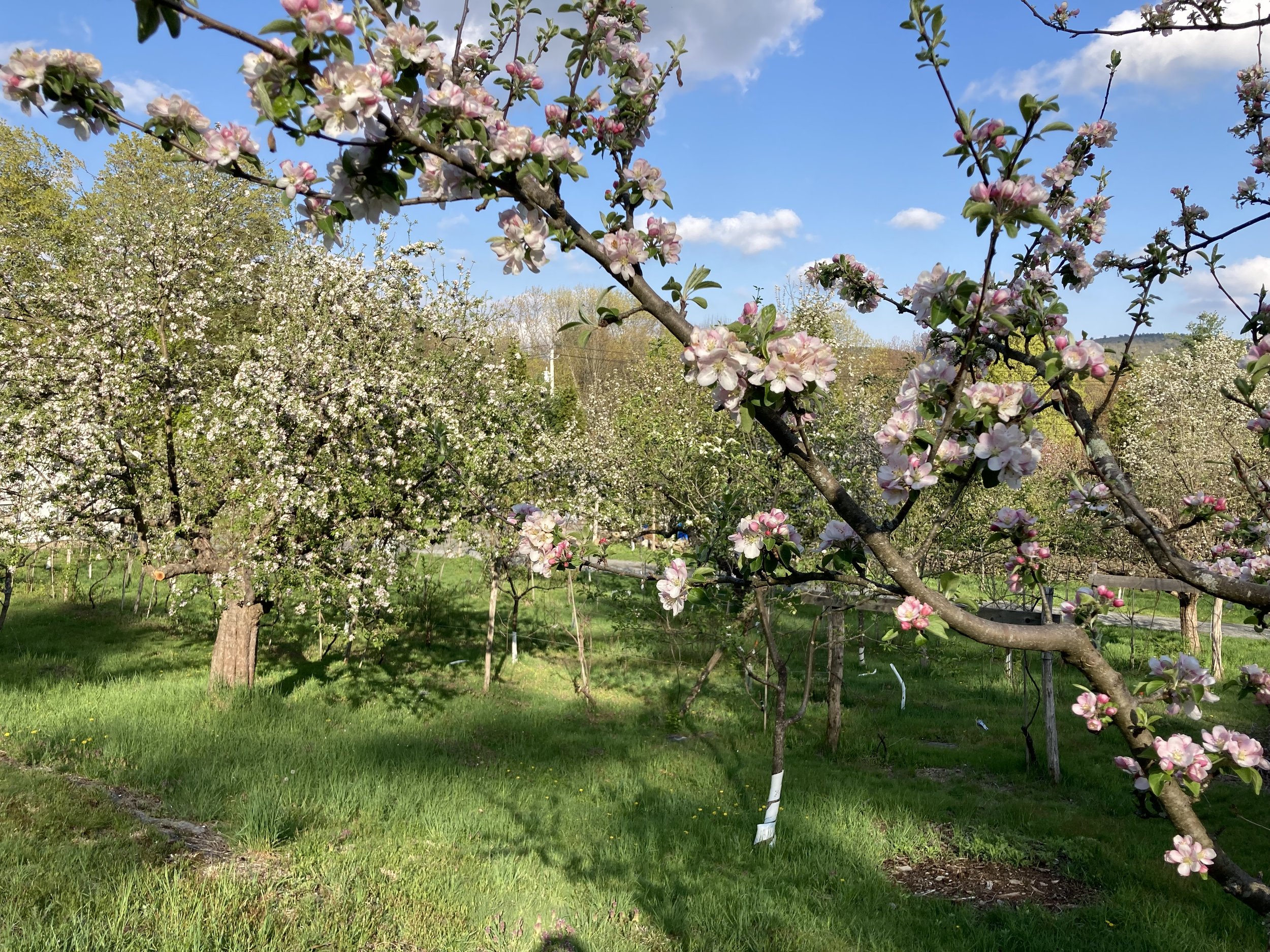
2023 Vintage Ciders available through our 2024 CSA:
Homestead Homestead Cider (84 cases made)
From our unsprayed “orphanage orchard,” including the Sullivan County All-Stars - a staggering range of apple types.
twelve 500ml bottles per case, $180/case
Standard Cider (84 cases made)
From a nearby Colonial-era homestead in North NJ, now growing heirloom American cider varieties in the back orchard.
twelve 500ml bottles per case, $180/case
Opera Singer (32 cases made)
From a single conspicuous tree about 100 years old--a true pippin growing in an old dairy pasture. Planted by cows.
Twelve 500ml bottles per case, $180/case
East Branch (36 cases made)
Foraged in northern Sullivan County, a blend of all available apples in the East Branch River watershed.
twelve 500ml bottles per case, $180/case
Callicoon Creeks (40 cases made)
Foraged in the watershed of the two branches of the Callicoon Creeks (North and East,) a blend of all available apples.
twelve 500ml bottles per case, $180/case
Central Sullivan (36 cases made)
Foraged in the plateau of central Sullivan County, a blend of all available apples (w/a high percentage of crabapples.)
twelve 500ml bottles per case, $180/case
Homestead Assortment Case:
(mixed case of the above, 2x each) $180/case
Also Available via CSA…
Previous Vintages:
2022 Elder Pomme (59 cases remain)
(made from Sullivan County foraged elderberry (2022) blended with 2021 crab apple, wild apple and wild pear.)
twelve 750ml bottles per case, discounted $225/case
2019 Appinette, (61 cases remain)
(a cuvee of 2019 Finger Lakes Traminette (grape) with 2019 Hudson Valley Golden Russet and other local apples)
twelve 750ml bottles per case, discounted $225/case
*Mixed Case of two above ciders: Elder Pomme/Appinette
(mixed case of 6x each) $225/case
2021 Bittersweet Cider (+/- 72 cases remain)
(made from European “bittersweet” apple varieites, naturally fermented with low carbonation. Basque-like in profile)
twelve 750ml bottles per case, $246/case
2021 Bittersharp Cider (+/- 72 cases remain)
(made from crab apples and other foraged high-acid / high-tannin wild varieties. Vintage American in profile)
twelve 750ml bottles per case, $246/case
*Mixed Case of two above ciders: Bittersweet and Bittersharp ciders
(mixed case of 6x each) $246/case
2023 Field Summary and Ciders
For growers in the Northeast, 2023 will be remembered for sub-freezing temperatures on May 18th. This is very late for us; usually the last hard freeze is April but last year it post-dated the apple blossom and fruit-set. Exposed to freezing temperatures at that stage, the seed dies, and then the tree abandons the fruiting effort. Apples don’t second-bud like grape vines.
The mountains in our region create many micro-climates and for some the entire crop was lost. Just 10 miles from me an orchard of 2000+ trees lost everything. Here in Wurtsboro, however, a massive wetland buffers the weather. We lost only about 25% that night. Plus, our blossom was heavy anyways (meaning the damage affected an abundance of potential apples), so when all was said and done, we fared pretty well.
Off the farm, we discovered other areas that were spared as well. By the end of harvest, our foraging numbers weren’t too bad, about 1/2 our usual haul (though more difficult than usual because we had to adjust to new locations.) This means our yearly “Locational series” was disrupted. Though we did harvest in 3 of the usual 7 regions (Callicoon Creeks, Central Sullivan, and East Branch), we are also experimenting with single-orchard ciders. We utilized apples from an organic farm near Port Jervis, and we have a cider solely from our homestead (we call the former, “Standard Cider” because it’s what commercially-made ciders should be, and the latter, “Homestead Homestead Cider.”)
Late freezes are a problem, but so are warm winters. This year, the temperatures never dropped below zero in Wurtsboro (for the first time ever) and the warmth is detrimental to most trees. The hemlocks, for instance, will soon follow the now-dead ash trees if we don’t get super-cold temperatures to control the Woolly Adelgid. Plus, deer populations, which are normally culled by long, hard winters, are more numerous and ravenous as they compete for forage. They prefer maple and oak saplings and now only pine, beach and other non-choice trees grow in the forests.
These are just a few examples of the connectivity between recent weather changes and tree ecology. It affects cider-making too. You may’ve noticed our ciders are less carbonated each year and this is because warm winters make long-fermentation more difficult. Increasingly, we have to rely on “suss-reserve” (juice preserved in the Fall) in the Spring to ensure bottle conditioning (natural carbonation is our best preservative), but this technique, in my opinion, is manipulation and wine-geeky. I’ll avoid it unless the barrel is absolutely dry.
We adapt. That’s what the living do. That’s not manipulative, it’s natural. Things are never “what they’re supposed to be,” and yet, as I’m sitting here tasting through the recently bottled 2023’s, I can still detect an “Aaron Burr thread” in the ciders. Maybe it’s our cellar yeast, maybe it’s my hand, or maybe it’s our region. I like that cider is new to us every year, but I also like consistency. I taste the two working as one.
Andy Brennan, May 2024